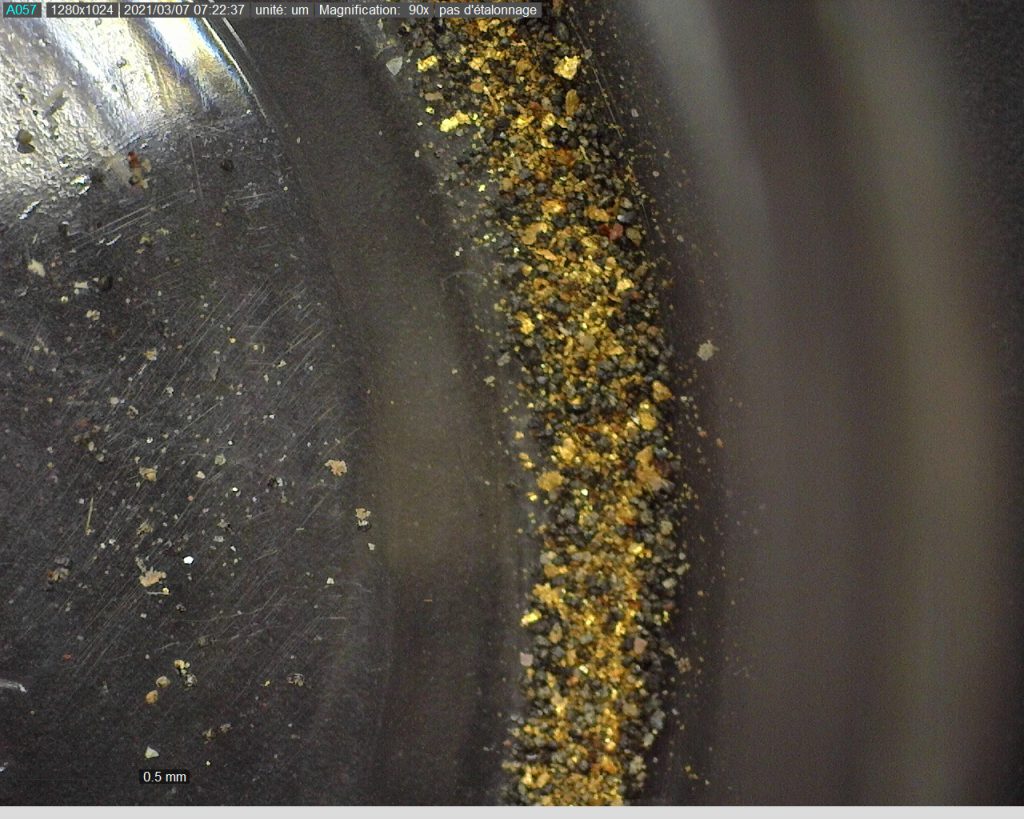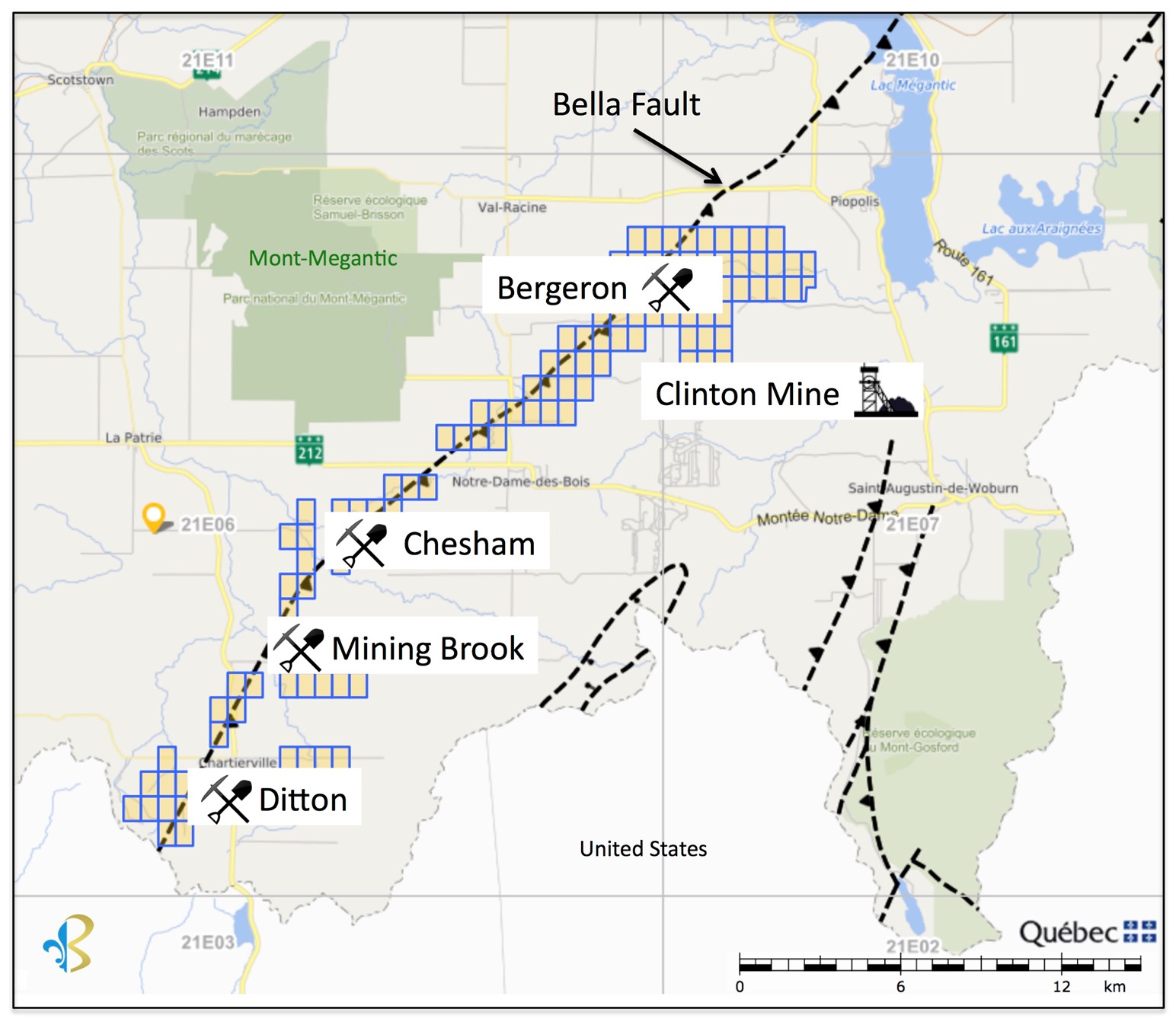Beauce Gold Fields Megantic Overburden Sample Returns 10 Grams Per Ton Gold in the Vicinity of the Bella Fault Line

Image of recovered gold from Megantic overburden sample 798741. Magnification 90X, Scale 0.5 mm (bottom right)
Beauce Gold Fields (Champs D’Or en Beauce) (TSX Venture: ¨BGF¨), (“BGF”), is pleased to announce  the results of its glacial overburden sampling program of 31 placer to hardrock properties staked throughout southern Quebec. The highest return from a 20kg sample came from the Megantic property returning 10 grams per ton of placer gold from a sand & gravel bank that crosses the Bella Fault line.
Patrick Levasseur, President and CEO of Beauce Gold Fields said, “We are very excited that our sampling program has allowed us to identified a second placer to hardrock property that holds the potential for new gold discoveries in Southern Quebec.” Mr. Levasseur added: “The Megantic property holds a similar geological model to the company’s flagship Saint-Simon-les-Mines Beauce Gold property whereby a major geological fault line follows along strike the historical placer gold deposit. We look forward to investigating these anomalies further this summer.”
Between October and December 2020, the Company collected 71, 20kg overburden samples from sand and gravel pits found on 31 prospective placer to hardrock properties staked throughout southern Quebec (press release January 12, 2021).   The objective was to identify placer gold anomalies in order to potentially trace their origins back to a lode gold deposit. A second objective was to identify sand & gravel banks of good size with the potential of holding interesting gold values for possible placer gold mining. Of all the samples taken, properties which recorded grades greater than 0.1 g /t Au were retained for further exploration.
RESULTS OF THE 2020 OVERBURDEN Â SURVEY
The 71 samples were processed by ExploLab in Val D’Or Quebec. Each sample of about 20kg was sifted through various mesh sizes to remove coarse materials. Coarse gold was recovered using various gravimetric methods. The concentrates were sent to Act Labs for analysis. (Disclosure : ExploLab is owned and operated by a Director of the Company)
With the exception of the Pozer River and Lac Etchemin samples, the samples which revealed interesting gold grades came from the Mégantic region.  Several anomalous samples are located near the Bella fault which crosses the Ditton, Chartierville, Chesam and the Bergeron River sectors of the Megantic property.
Table 1 shows the best gold results for the concentrates and for  gold grains.
MEGANTIC SAMPLES
Sample 798741 was collected about 200m west of the Chesham River, south-east of Mont Mégantic. The sample was taken from the surface (-30cm) of a sand pit and is represented by fine, oxidized sands. The grains of gold observed in the concentrate are numerous and angular. The weight of gold in this 20kg bulk sample gave 0.2grams. The balance of the heavy mineral concentrate returned 178 ppb Au. The gold content is established at 10 grams per tonne of sand or approximately 0.55 cubic meters. The Bella fault crosses the northern part of the property and may well be the source of these very high gold concentrations in surface deposits.
Surface gravel in the Chesham River area is reported (GM 48717) to contain flake gold. The deeper gravels contain numerous nuggets up to several grams in mass. The gold grains have very accentuated roughness indicating short traveled distance. It is assumed that the source of the alluvial gold would be in the volcanic rocks of the Frontenac Formation.
Sample 798526 of the Mining Brook area was taken 3.2km southwest of Mining Brook returned the best gold value of all samples (1.06 g / t Au). The sample was taken from a large gravel pit which locally measures more than 10 meters thick.
An old churn drill hole (referred to as No. 7 in GM 42843) located less than 500 meters to the west of the gravel pit passed through significant gold values over an 8-meter thickness of gravel with several gold flakes. The hole No 7 and sample 798526 could correspond to large old river channel measuring over 1.6km long.
In addition, an old diamond drill hole S-2 located only a few hundred meters northwest of the sample 798526 may have crossed a large shear zone which would correspond to the Bella fault. According to the hole S-2 log, visible gold was observed at a depth of 240m in a very altered quartz vein and in this deformation corridor (GM 42843).
Mining Brook is the second-best known placer gold district south of the Beauce. This alluvial placer of post-glacial origin would be the result of the reconcentration of pre-glacial (or inter-glacial) gold deposits taken up by the last glaciation and dispersed over the entire region. The gold itself likely originated from gold mineralized quartz veins common in the region. According to Goodwin (1933), approximately 857.25 kg of gold were extracted by hand from the bed of the river between 1868 and 1883.
Samples 798584 and 798586 of the Audet block returned anomalous values in gold. Sample 798584 contains visible and very delicate gold. The recognition of this sector was initiated by the results of  geochemical survey conducted by the Geological Survey of Canada (“GSC”) in 1984. A sample of heavy minerals from the creek gravels contained visible gold grains the size of a pinhead (+ 850mm). The GSC survey had collected more than 700 samples, but only 3 contained coarse gold, including one from the Gilbert River. The presence of angular gold suggests a probably local source in Audet area. Pyrite has also been noticed in the sample 798586 with angular edges which suggests a local source. Follow – up analysis of the gold content in pyrite  could lead us to find the source of the gold locally.
Frontenac Showing
The Frontenac Showing is in the volcanics of the Frontenac Formation. It crosses the property of Audet and contain showings of copper and gold associated with iron formations. The Frontenac Showing contains anomalous gold values found in quartz veins closely related to iron formations, with one grab sample returned 1.56% Cu, 758 ppb Au, 1.6 g / t Ag (GM 55294). The Frontenac volcanics are cut by shear zone structure which may have been a conduit for mineralizing fluids.
SAINT-ISIDORE:
Sample 798550 was collected from a large gravel pit on the edge of the Canada-US border and confirmed the presence of gold in overburden. Historical results show gold is present in multiple locations. Two old heavy mineral concentrate samples that cut large deposits of sand and gravel in the Saint-Isidore region returned 1.4 g/t Au and 2.8g/t Au (Maurice DP 1332)
POZER RIVER:
Sample 798511 was taken from a large operating   gravel pit. near the Pozer River. The gravel carried by the river was trapped in one of the bends of the river. This topographic obstacle favors the accumulation of gold in the deposits of the river.
LAC ETCHEMIN:
Sample 798516 gave the second highest gold grade (432 ppb Au) from the 2020 survey. The sample was collected from a huge operating gravel pit, found in older Quaternary deposits which could correspond to pre-glacial sediments similar to those found at Saint-Simon-les-Mines. The major Brompton-Baie-Verte fault crosses the property and is known to host gold mineralization and is interpreted to extend to Newfoundland. The source of gold could be related to this important structure.
Jean Bernard, B,Sc. Geo., is a qualified person as defined by NI 43-101, has reviewed and approved the technical information presented in this release
About the Megantic Property
The Mégantic property extends southwest to the USA border of New Hampshire and to the northeast to Lac Mégantic. The property extends for at least 30 km along the axis of the Bella Fault. It is divided into four areas: the Ditton, the Mining Brook, the Chesham and Bergeron rivers.
The Mégantic property is located at the foot of the granite intrusion of Mont Mégantic. It partly occupies the Compton Formation composed of graphitic and pelitic metasedimentary rocks of Siluro-Devonian age. These sedimentary rocks are in discordant contact in the center of the terrain with the volcanic sequence (basalts, andesites and dacites) of the Siluro-Devonian Formation of the Frontenac Formation. The Bella fault, which is the major structural element of the Mégantic property, is in contact between the Compton and Frontenac Formations.
About Beauce Gold Fields
Beauce Gold Fields is a gold exploration company focused on placer to hard rock exploration in the Beauce region of Southern Quebec. The Company’s flagship property is the St-Simon-les-Mines Gold project site of Canada’s first gold rush that pre-dates the Yukon Klondike. The Beauce region hosted some of the largest historical placer gold mines in Eastern North America that were active from 1860s to the 1960s It produced some of the largest gold nuggets in Canadian mining history (50oz to 71oz). The intent of Beauce Gold Fields is to trace the placer gold workings back to the bedrock source and uncover economic bedrock gold mineralization.
Comprising 152 contiguous claims and 7 real estate lots, the project area contains a six kilometer long placer channel consisting of unconsolidated gold-bearing auriferous units of a lower saprolite and an upper brown diamictite.
The Company has identified a major Fault Line in bedrock that coincides with geophysical findings of an interpreted fault structure across the property. Evidence suggests the erosion of the Fault Line or related fractures as a probable source of the historical placer gold channel, and has conducted bedrock sampling and geophysics outside the expression of the placer gold channel.
For further information contact
Patrick Levasseur, President and CEO Tel: (514) 262-9239
Bernard J. Tourillon, Chairman and COO Tel (514) 907-1011
www.beaucegold.com
Disclaimers:
This press release contains certain forward-looking statements, including, without limitation, statements containing the words “may”, “plan”, “will”, “estimate”, “continue”, “anticipate”, “intend”, “expect”, “in the process” and other similar expressions which constitute “forward-looking information” within the meaning of applicable securities laws. Forward-looking statements reflect the Company’s current expectation and assumptions, and are subject to a number of risks and uncertainties that could cause actual results to differ materially from those anticipated. These forward-looking statements involve risks and uncertainties including, but not limited to, our expectations regarding mineral exploration. Such statements reflect the current views of the Company with respect to future events and are subject to certain risks and uncertainties and other risks detailed from time-to-time in the Company’s on-going filings with the securities regulatory authorities, which filings can be found at www.sedar.com. Actual results, events, and performance may differ materially. Readers are cautioned not to place undue reliance on these forward-looking statements. The Company undertakes no obligation to publicly update or revise any forward-looking statements either as a result of new information, future events or otherwise, except as required by applicable securities laws.
Neither the TSX Venture Exchange nor its Regulation Services Provider (as that term is defined in the policies of the TSX Venture Exchange) accepts responsibility for the adequacy or accuracy of this release.


